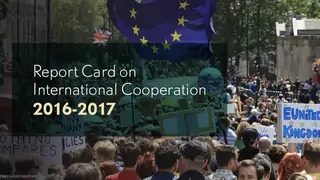International Cooperation in 2016 Deserves a Low Grade, Say Global Think Tank Leaders

Last updated May 9, 2017 8:00 am (EST)

- News Releases
The third annual Report Card on International Cooperation sharply downgraded its assessment of efforts to mitigate the world’s most vexing problems in 2016 to a C-, falling from a B grade in 2015.
The Council of Councils, a Council on Foreign Relations (CFR) initiative comprising twenty-six major international policy institutes, surveyed the heads of member think tanks to evaluate the world’s performance on ten of the most important transnational challenges of 2016.
More on:
“Limited progress in combating climate change and advancing development in 2016 was overwhelmed by dismal failures of international efforts to promote global trade, resolve internal conflicts, and advance cyber governance,” said CFR President Richard N. Haass. “Nationalist electoral campaigns throughout the world sailed to victory on promises to retreat from international commitments. This suggests 2017 will face even more fundamental challenges to international cooperation.”
The Report Card offers the following individual grades:
—Mitigating & Adapting to Climate Change: B
—Promoting Global Health: B
—Advancing Development: B-
—Preventing Nuclear Proliferation: B-
—Managing the Global Economy: C+
—Combating Transnational Terrorism: C
—Preventing & Responding to Violent Conflict Between States: C
—Managing Cyber Governance: C-
—Expanding Global Trade: D+
—Preventing & Responding to Internal Violent Conflict: D+
Of the ten challenges, respondents indicated that fighting terrorism held the most potential for progress in 2017. Despite being graded a mediocre score of C, this was the only area in which respondents saw an improvement over 2015.
“With a rising number of terrorist incidents in 2016, there has been a stronger consensus across countries about the need to strengthen cooperation in combating transnational terrorism,” said Abdulaziz Sager, chairman of the Gulf Research Center in Saudi Arabia. “What remains missing is a broader commitment on dealing with the root causes of terrorism.”
More on:
Preventing and responding to violent conflict between states should be the top priority for world leaders in 2017, according to the think tank leaders polled between December 2016 and January 2017.
“Tensions have emerged in places where no one could have foreseen just a few months ago,” said Luis Rubio, president of the Mexican Council on Foreign Relations. “The current world order is being challenged and uncertainty as to what will emerge in its place abounds.”
Explore the Council of Councils Report Card on International Cooperation at www.cfr.org/councilofcouncils/reportcard. Learn more about the methodology here.
The Report Card was made possible by the generous support of the Robina Foundation.
The Council of Councils is a CFR initiative connecting leading foreign policy institutes from around the world in a common conversation on issues of global governance and multilateral cooperation. The Council of Councils draws on the best thinking from around the world to find common ground on shared threats, build support for innovative ideas, and introduce remedies into the public debate and policymaking processes of member countries.
 Online Store
Online Store